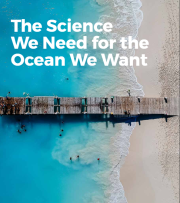22 November 2019, Manila, the Philippines, the three-day WESTPAC Workshop on Ocean Oxygen Network (O2NE) marked the beginning of an international collaborative effort in the region to monitor and research on ocean deoxygenation (or “ocean hypoxia”). The workshop, attended by around 20 experts from eight countries, aimed to advance the understanding of the ocean deoxygenation and identify ways to synergize efforts in the region.
Oxygen is critical to healthy ocean ecosystems. Ocean deoxygenation, a decline in oxygen concentration in ocean, causes a variety of impacts on ocean ecosystems which require oxygen for productivity and provide services that sustain people’s livelihoods. It is estimated that, since the 1960s, the area of low oxygen water in the open ocean has increased by 4.5 million km2 and over 500 low oxygen sites have been identified around the world.
Ocean deoxygenation resulted primarily from two anthropogenic stressors: global warming which affects oceans worldwide, and excess nutrient loads from human activities, including domestic sewage, industrial effluents, agriculture and marine aquaculture.
The Western Pacific is the most densely populated and undergoing the most rapid development. Human activities have been generating huge impacts on ocean ecosystems in the region. There is an urgent need, therefore, to conduct continued research, monitoring, assessment and stakeholders’ engagement that are required to not only detect the spatial and temporal extent of ocean deoxygenation, but also to advance the understanding of underlying processes to develop adaption and mitigation strategies.
WESTPAC initiated a Working Group on the Ocean Oxygen Network in a bid to establish a network and facilitate interactions and communication among researchers studying various aspects of deoxygenation, and help inform policymakers on the issue of declining oxygen in their coastal and open waters.
The first workshop of this WG brought experts together and reviewed the status of ocean deoxygenation and its associated research and monitoring efforts in the WESTPAC region. Participants further analysed the locations, causes, and impacts of deoxygenation on people’s livelihoods and marine ecosystems such as fish kills. Discussions were held on how to facilitate communication and information-sharing among researchers studying deoxygenation through efforts such as a database and on how to inform policymakers and stakeholders to stimulate awareness of and action on the deoxygenation issue. The potential contribution of the WESTPAC O2NE to the United Nations Sustainable Development Goals and the UN Decade of Ocean Science for Sustainable Development were also explored during the workshop.
The three-day heated discussions finally led to the formulation of an plan of joint actions, which include: reviewing all published papers related to eutrophication and ocean hypoxia in the region, and establishing a one-stop website or database containing all relevant information and technical guidelines for dissolved oxygen measurement. To advance the understanding of ocean deoxygenation, participants also identified several WESTPAC hypoxia pilot sites where eutrophication, harmful algal blooms, and massive fish mortalities frequently occurred over the recent years. Building on their existing capacities, joint research, monitoring, inter-comparison, and assessment will be pursued in a concerted manner, with a view to understanding clearly the ocean deoxygenation process in these pilot sites. Meanwhile, in view of the importance to develop the national and regional research and monitoring capacity for ocean deoxygenation, participants were fully aware of the advanced research that the Xiamen University of China has been leading on marine environmental science, and thus requested the Sub-Commission to explore any training and research opportunity with the University, especially its hosted State Key Lab of Marine Environmental Science. Finally, the WESTPAC O2NE decided to organize and gather again at an ocean deoxygenation session in the 11th WESTPAC International Marine Science Conference which will take place in Yogyakarta, Indonesia, 25-28 August 2020.
WESTPAC would like to extend its appreciation to the Republic of Korea’s Ministry of Ocean and Fisheries for its financial support for the workshop. The workshop was organized in cooperation with the Partnerships in Environmental Management for the Seas of East Asia (PEMSEA) and the Marine Science Institute of the University of the Philippines (MSI-UP).




